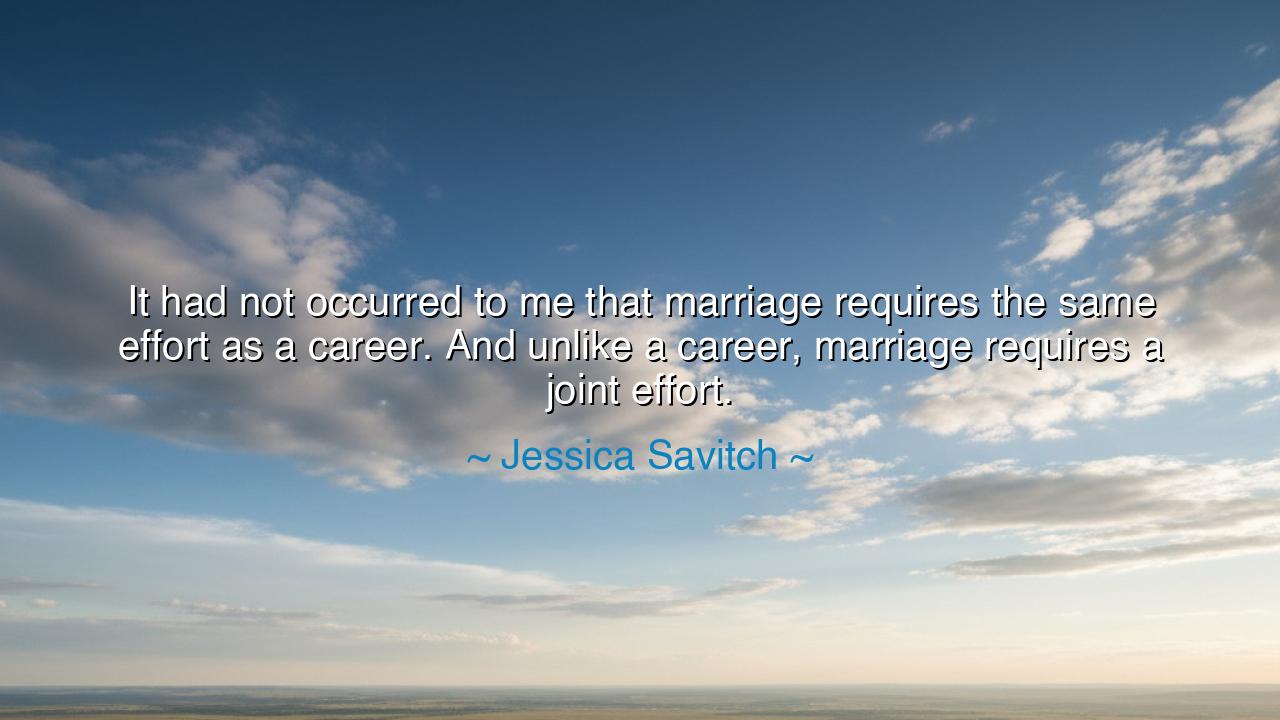
It had not occurred to me that marriage requires the same effort
It had not occurred to me that marriage requires the same effort as a career. And unlike a career, marriage requires a joint effort.






Hear now the words of Jessica Savitch, a voice of ambition and tragedy, who once said: “It had not occurred to me that marriage requires the same effort as a career. And unlike a career, marriage requires a joint effort.” In these words lies a revelation born not from theory but from experience — the moment when one who had conquered the public stage discovered the private battlefield of the heart. Her confession carries the weight of every person who has chased success outwardly, only to realize that love, too, demands labor, discipline, and devotion. Yet where a career rewards the individual, marriage asks for something deeper: the surrender of ego to the harmony of two.
The origin of this quote can be found in the life of Jessica Savitch, the pioneering American television news anchor who rose swiftly to fame in the 1970s — an age when few women held such power in broadcasting. Her career blazed like lightning, but her personal life was marked by storms. In her rise to prominence, she gave herself wholly to ambition, to excellence, to the relentless pursuit of perfection demanded by her profession. Yet, in that pursuit, she came to see what many have learned too late: that achievement in love cannot be earned in solitude. It is not built by one will, but by two hearts that labor together toward understanding.
The ancients, too, knew this truth. In the writings of Plutarch, marriage was described as “the blending of two lives into one harmonious tune.” It was not to be taken lightly, for unlike the craft of politics, war, or art, it required constant tending. Where one person’s ambition might conquer kingdoms, it could not build a home. And so, Savitch’s realization stands beside the wisdom of centuries — that love, if left untended, decays faster than any empire. Effort, in both realms, is the price of endurance. But while careers exalt self-discipline, marriage demands shared humility, the ability to yield without losing oneself.
Her words also speak to a universal imbalance in the human heart: we are trained to strive, but rarely to share. The world rewards the solitary victor — the one who competes, climbs, and claims. Yet love is not a competition; it is a collaboration, a union in which both must labor equally or both will fail together. Many learn this too late — that even the strongest will cannot sustain a bond built on one-sided effort. In work, you may triumph alone; in marriage, there is no victory without unity.
Consider the story of Marcus Aurelius and Faustina the Younger, the Roman emperor and empress. He was philosopher and ruler; she, partner and mother. Though history records their quarrels and burdens, Aurelius never ceased to write of her in his private meditations with respect and gratitude. He understood, as Savitch later would, that marriage was not a static arrangement but a living practice — a discipline of mutual patience, forgiveness, and renewal. Empires may fall, but such lessons remain timeless: even the wisest ruler cannot command affection; it must be built daily, hand in hand.
Savitch’s statement, though simple, carries the sorrow of realization — that love neglected becomes fragile, no matter how bright the careers that surround it. Her words are both confession and counsel: success in public life cannot compensate for the failures of private connection. She understood too late that what sustains the soul is not applause, but companionship. And just as careers demand persistence, communication, and resilience, so too must marriage be worked at — not with rivalry, but with cooperation, not with ambition, but with understanding.
Let the lesson, then, be passed down like fire from one age to the next: love is not self-sustaining. It must be fed with kindness, humility, and effort from both sides. The wise will remember that the labor of love is sacred — that tending to another’s heart is no less noble than building one’s legacy. Work together, speak with honesty, forgive quickly, and choose daily the one you vowed to cherish.
For in the end, as Jessica Savitch discovered, both career and marriage demand strength — but only one demands that we learn to share it. The greatest success is not to stand alone in triumph, but to walk beside another, still hand in hand, through the triumphs and the trials alike.






AAdministratorAdministrator
Welcome, honored guests. Please leave a comment, we will respond soon